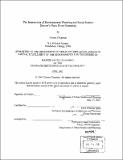The intersection of environmental planning and social justice : Denver's Platte River Greenway
Author(s)
Chapman, Ginette (Ginette Ariana), 1977-
DownloadFull printable version (8.006Mb)
Other Contributors
Massachusetts Institute of Technology. Dept. of Urban Studies and Planning.
Advisor
Anne Whiston Spirn.
Terms of use
Metadata
Show full item recordAbstract
Environmental justice activists and researchers in the last several decades have drawn public attention to the disproportionate exposure to environmental risk (primarily toxicity) that low-income communities and communities of color experience. The environmental justice movement has devoted much less attention to the broader array of environmental issues that affect the welfare of low-income and minority communities. These include risk from natural hazards (like flooding), access to open space, recreational opportunities, and livability. Environmental planning affects and can enhance justice by reducing risks and providing benefits (including benefits not traditionally associated with the environment, such as employment opportunities). I consider planning process issues, community building, use of space, economic issues, safety, livability, and cultural issues to understand the full range of justice implications of environmental planning. This thesis examines the planning and development of the Platte River Greenway in Denver to understand how environmental planning practice relates to justice. Initially planned and developed in the mid- to late-1970s, the Platte River Greenway is a 10.5-mile stretch of trails and pocket parks along an urban river that runs near many low-income and minority communities. The Platte River Greenway contributed to social justice in a number of ways. The planning process, however, did not explicitly engage justice as a goal. The one point early in the process when justice received explicit attention illustrates how such consideration can lead to greater parity in environmental benefits for disadvantaged communities. Based on this case, the thesis argues that justice should be a more explicit goal in environmental planning practice. The thesis offers recommendations for how environmental planners can actively frame and manage environmental planning processes to advance social justice.
Description
Thesis (M.C.P.)--Massachusetts Institute of Technology, Dept. of Urban Studies and Planning, 2001. Includes bibliographical references (leaves 100-104).
Date issued
2001Department
Massachusetts Institute of Technology. Department of Urban Studies and PlanningPublisher
Massachusetts Institute of Technology
Keywords
Urban Studies and Planning.